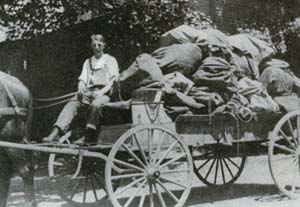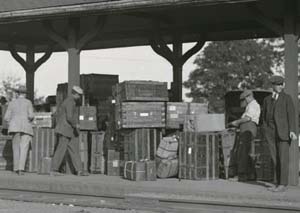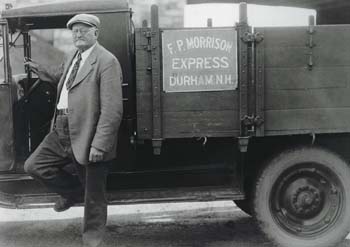 |
 |
| current issue |  |
past issues |  |
send a letter/news |  |
address update |  |
advertise |  |
about us |  |
alumni home |
On Ben's Farm
Treasure ChestsStudents and their luggage were a boon to early Durham entrepreneurs
by Mylinda Woodward '97

|
In 1914, the notoriously thrifty Dean Charles Pettee rode his new horse to the Durham Livery to make stabling arrangements. But since the stable's proprietor, Frank P. Morrison, was something of a skinflint himself, the transaction was anything but swift. Morrison said he would charge $10 per week to board the horse; the dean refused. A half-hour's haggling ensued before Morrison begrudgingly agreed to $5.50. As Pettee was about to leave, it occurred to him to ask about the horse's by-product, thinking he could use it for his garden. "Dean," Morrison said, slapping his knee with his hat, "at $5.50 a month, there ain't going to be no manure from that horse."
It was no coincidence that Morrison took over the management of the Durham Livery Stable the same year that the cornerstone of Thompson Hall was laid in 1892. Twenty-eight-year-old Frank Morrison quickly saw the potential that this influx of young people would offer the right businessman and the right business.

|
As the only livery stable in town, Morrison had a virtual monopoly. He kept 25 horses and a number of hacks, and provided students with anything from a horse and buggy for a Sunday drive and a sleigh for a winter excursion to a four-horse "bargie" to carry a large group on a class trip.
His services were most in demand for formal dances held on the top floor of Thompson Hall. No proper young lady would walk to such an affair, so Morrison collected all the carriages from miles around. On the evening of the ball, Morrison's hacks ran a continuous loop unloading students under the T-Hall arch.
Morrison also served as mail messenger, which meant meeting trains and taking the mail to the post office. For a fee, he would obligingly take passengers as well. In 1913, parcel post service became available and students could send laundry home to Mom for a little as 15 cents. Soon a common sight on Main Street was a Morrison wagon filled with laundry bags heading for the depot.
 EXPRESSLY FOR DURHAM: Livery owner Frank P. Morrison in 1938.
EXPRESSLY FOR DURHAM: Livery owner Frank P. Morrison in 1938.
|
In the fall, Morrison and other local wagon owners competed--sometimes to extremes--to carry students' trunks. According to the late Leon Batchelder '29, hired men would ride the trains and sign up students and their luggage before they disembarked in Durham. "The methods of operation of the 'trunk signers' were something to behold," he recalled. "Competition became so intense that fist fights were not uncommon between the riders and the train crew trying to maintain order. Bills were sent to the college for broken windows."
Wherever he saw a need, Morrison would do what he could to fill it. For victory bonfires after football games, freshmen were required to collect wood for a huge blaze. Pulling one of Morrison's wagons, they would fill it with anything that would burn. Once, however, in their enthusiasm they added the wagon itself to the fire. After the college reimbursed Morrison for the loss of his wagon, it became standard practice for him to leave an old, beat-up wagon in his side yard. Freshmen would happily swipe it for their bonfire fodder, and Morrison cleverly supplemented his income. (Finally, tired of paying for articles which "mysteriously disappeared," the college began to furnish a pile of wood and trash on Bonfire Hill.)
As cars began to replace horses, Morrison changed with the times. In 1929, he drove the federal "Express" truck delivering parcel post packages. A few years later he bought a touring car and established Durham's first and almost only taxi service. In 1952, at age 88, Morrison died, having delivered the U.S. mail, students and their trunks for more than 50 years.
blog comments powered by Disqus
